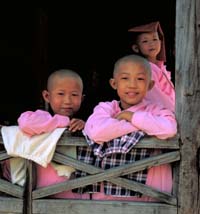Asian Buddhist Network
 |
 |
 |
Buddhist values are taught from an early age and have a profound influence all across Asia. |
The Asian Buddhist network is an informal way for Buddhists in Asia to share experiences in more formal ways to solve environmental and development issues.
The network functions at two levels - at the local level it brings monks, nuns and Buddhist communities together, and at a political and economic level it brings together leaders who either are Buddhist themselves or whose countries are traditionally Buddhist.
Sharing solutions
So far, groups have set up a number of workshops and meetings to share problems and stories and solutions. Already these have inspired many to return to their own monasteries, villages and towns and start environmental and development initiatives of their own.
These initiatives include encouraging more forest retreats, establishing tree nurseries and reforestation schemes. implementing techniques to improve fuelwood and water use, educating people in how to care for nature, and sharing information on how to use sacred texts to remember how and why to look after their traditional holy places (and in some cases even reminding them where they are sited, and what they mean).
It has been supported by ARC, the World Bank, WWF, local charities and some generous donors.
Country links
Links
Asian Buddhist Network home page
In 2004 a major conference and series of workshops for the Southeast Asian Buddhist community was held in Phnom Penh.
Pages about Mongolian Environmental Wisdom, taken from the Handbook.
The Mongolian Lord of Nature.
Sacred texts, places and ovoos.
Sacred sites
in Mongolia.
Traditional Environmental Law in Mongolia.
The work that the monks, in conjunction with ARC and the World Bank and others, are carrying out to rediscover the sutras about sacred land in Mongolia.
Do you want to support this?
For full contact and address details of Mongolian Buddhist Monasteries, please see page 57 of the
Handbook. And for details of local Development, Environmental and Educational NGOs, please visit pages 58-59 of the
Handbook.
Other links to Mongolian Buddhism and the Environment
Link here to access the news story about the launch of the Mongolian Buddhist Handbook.
Link
here to download the Mongolian Buddhist Handbook in English. (Please note this file is 1.15MB)
Link
here to download the Mongolian version of the Handbook.(A 2MB file.)
Link here to download the guide to the Mongolian Buddhists’ Eight Year Plan (this file is 4.13MB).
Link to Mongolian Case Studies.
And
here on how to make contact with the Sangha.
To download the A3 poster of a new thangka about Buddhists protecting Nature, link
here (5.61MB).
Brief History of Mongolian Buddhism.
Buddhism and the Environment.
Women in Buddhism in Mongolia.
Key Figures in Mongolian Buddhism.
Key Meetings in Mongolia.
Mongolian Buddhists and Development.
Mongolian Buddhists and Ecology.
Mongolian Buddhist Hunting Ban.
The Lost Sutras.
|

